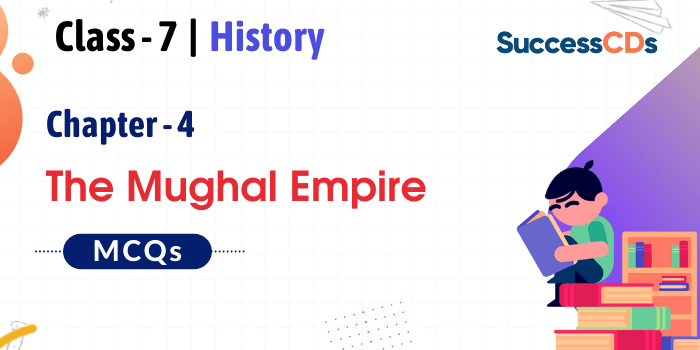NCERT Class 7 History Chapter 4 “The Mughal Empire” Multiple Choice Question with Answers
The Mughal Empire MCQs – Here is a compilation of Free MCQs of Class 7 History Book Chapter 4 The Mughal Empire. Students can practice free MCQs as have been added by CBSE in the new exam pattern. At the end of Multiple Choice Questions, the answer key has also been provided for your reference.
Q1. The name of residence of Mughal Emperors in Delhi was
A. The Red Fort
B. The Old Fort.
C. The Siri Fort
D. None of these
Q2. Genghis Khan was a ruler of this tribe:
A. Turkish
B. Mongols
C. Huns
D. None of these
Q3. Which Mughal Emperor was defeated by Sher Shah Suri?
A. Babur
B. Humayun
C. Akbar
D. Jahangir
Q4. What is the ruling period of Jahangir?
A. 1526-1530 AD
B. 1530-1556 AD
C. 1556-1605 AD
D. 1605-1627 AD
Q5. Which Sikh Guru’s Martyrdom took place during Jahangir’s reign?
A. Guru Nanak Devji
B. Guru Gobind Singhji
C. Guru Arjun Devji
D. Guru Tegh Bahadur Ji
Q6. What was the capital of Mirza Hakim Akhar’s half brother?
A. Kabul
B. Afghan
C. Morocco
D. Sind
Q7. Rathor Rajput was related to
A. Marwar
B. Mewar
C. Amber
D. Ranthambore
Q8. Which ruler was insulted by Aurangzeb?
A. Man Singh
B. Rana Pratap
C. Shivaji
D. All
Q9. The salary of the Mansabdars was called
A. Mansab
B. Jat
C. Jagi
D. Zabt
Q10. Who was Akbar’s Revenue minister?
A. Todar Mai
B. Birbal
C. Abul Fazl
D. Tansen
Q11. Akbar, a great Mughal Emperor was known for his _______
A. Tolerant religious policy
B. Good administration
C. Economic reforms and works
D. All of these
Q12. The minister-in-charge of religious and charitable patronage was known as
A. Zamindar
B. Bakhshi
C. Sadr
D. Bigot
Q13. The literal meaning of Sulh-i kul is
A. Peace
B. Religion
C. Universal peace
D. Inheritance
Q14. What was the approximate number of mansabdars in Shah Jahan’s reign?
A. 6000
B. 4000
C. 8000
D. 10,000
Q15. The first war of Panipat was fought between ….?
A. Humayun and Ibraham Lodi
B. Akbar and Ibraham
C. Babur and ibrahim
D. Lodi Sher Khan and Ibraham Lodi
Q16. The war fought between Babur and Rana Sangha is called the …..?
A. Khanwa war
B. Panipat war
C. Chausa war
D. Kannauj war
Q17. Who fought Chausa and Kannauj wars against Humayun?
A. Sher Khan
B. Bairam Khan
C. Mirza Hakim
D. Safavid Shah
Q18. Which Mughal Emperor spent his last days in prison?
A. Akbar
B. Shah Jahan
C. Humayun
D. Babur
Q19. Who was the mother of Shah jahan?
A. Mewar Princess
B. Rajput princess
C. Bijapur princess
D. Rathore princess
Q20. Number of Mansabdars in Aurangzeb’s reign were?
A. 75
B. 79
C. 87
D. 90
Q21. Who wrote the Akbar nama ?
A. Abul Faizi
B. Abul Fazal
C. Todar mal
D. None
Q22. The interesting aspect about Ain i Akbari is …..?
A. Its pictorial details
B. Its ancestral details
C. Its administrative details
D. Its rich statistical details
Q23. What is the meaning of the word Diwan?
A. Revenue officer
B. Administrative officer
C. Finance officer
D. Legal officer
Q24. What was the capital of Mirza Hakim, Akbar’s half brother?
A. Kabul
B. Morocco
C. Sindh
D. Afghan
Q25. What was the other name of Prince Khurram?
A. Jahangir
B. Shah jahan
C. Aurangzeb
D. None
Q26. In which year did Humayun recapture Delhi?
A. 1552
B. 1553
C. 1554
D. 1555
Q27. Who was the first Mughal Emperor?
A. Babur
B. Humayun
C. Akbar
D. Jahangir
Q28. When was Shivaji insulted?
A. When he came to accept Marathi authority
B. When he came accept Mughal authority
C. When he declined mughal authority
D. None
Q29. What were the central provinces under the rule of the Mughals?
A. Lahore
B. Chittor
C. Agra
D. All
Q30. When did Humayun re establish the Mughal empire in India
A. 1320 AD
B. 1530 AD
C. 1600 AD
D. 1324 AD
Answer key for Class 7 History Book Chapter 4 “The Mughal Empire” MCQs
| Question No. | Answer | Question No. | Answer |
| 1 | A | 16 | A |
| 2 | B | 17 | A |
| 3 | B | 18 | B |
| 4 | D | 19 | D |
| 5 | C | 20 | B |
| 6 | A | 21 | B |
| 7 | A | 22 | D |
| 8 | C | 23 | C |
| 9 | C | 24 | A |
| 10 | A | 25 | B |
| 11 | D | 26 | D |
| 12 | C | 27 | A |
| 13 | C | 28 | B |
| 14 | C | 29 | D |
| 15 | C | 30 | B |
